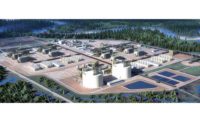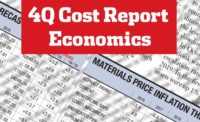3Q Cost Report: Tariff-Exempt LNG Projects Irk Canada Steel Sector

LNG Canada project, estimated to cost $30 billion, gained exemptions from new federal steel import tariffs.
PHOTO COURTESY ROYAL DUTCH SHELL
Canadian steel companies are blasting a federal government decision to exempt two giant LNG projects in British Columbia from punitive duties on cheaper Chinese steel. The Canadian Institute for Steel Construction contends the decision will potentially cost hundreds of thousands of jobs in the steel industry and in construction.
The Canadian International Trade Tribunal levied duties on imports of fabricated structural steel after China, South Korea and Spain “were found to be illegally dumping into Canada,” CISC claims.
In a recent report, the trade group argued that, free from the threat of punitive tariffs, developers of the planned $1.2-billion Woodfibre LNG and $30-billion LNG Canada projects will import massive modularized segments from China and other countries, with all the “equipment and components preinstalled.”
Modular components will be assembled on site, requiring far fewer workers than typically needed for such large projects, according to CISC. The group estimates the tariff exemptions will result in the loss of more than $31 billion in work for Canadian steelmakers and steel construction firms.
|
Related Link |
‘Dumbfounding’
CISC appealed the tariff decision in Canada’s federal court. “For the government to call their own fair-trade process a trade barrier is dumbfounding,” said Ed Whalen, CISC president and CEO in a statement, terming the decision “very disappointing. This is a hundreds-of-thousands-of-jobs-lost kind of mistake.”
The debate comes at a crucial juncture in plans for tens of billions in new LNG projects along Canada’s west coast, with up to 20 planned as part of a push to rev up the country’s natural gas exports.
Royal Dutch Shell and other investors behind LNG Canada decided to move forward after the federal government exempted the project from punitive 25% duties on Chinese steel. The Woodfibre project recently cleared all required regulatory approvals, with developers now awaiting final word from investors before pushing on construction. Canada Finance Minister Bill Morneau exempted it in what was considered a major boost.
Developers of big liquified natural gas projects appealed to the government to be exempt from new tariffs on fabricated structural steel imports.
Other LNG projects now in approval or planning stages include the $11.3-billion Kitimat, set to take shape near LNG Canada.
Woodside Energy plans to sell part of its project stake to a new investor, possibly from the Middle East. The Australian oil and gas giant owns 50% of the project, with partner Chevron Corp. owning the remainder.
Shell and LNG Canada investors, in filing a claim to the tribunal, say that without the exemptions, the steel tariffs would have had a potentially massive impact on the project, risking future phases—including added gas liquefaction units that would double plant capacity. Project officials said there would be a “scaling back of production targets, delays and investor uncertainty for any additional required capital.”
At a recent event in Vancouver, CEOs of LNG Canada’s two main backers, Shell Canada and Petronas Canada, disputed CISC’s value estimates on work losses for Canadian firms by the tariff exemptions and offshoring of work. They said the massive, multistory LNG modules set to be built in Asia account for only a portion of the project’s $12.8 billion in hard costs.
The project still will rely on Canadian workers for foundations, including large amounts of rebar, among other work, the executives told the publication Business Vancouver. Most overall spending will be in Canada, an LNG Canada spokeswoman also told the publication.
Ian Archer, an IHS Markit natural-gas sector analyst based in Calgary, says that Canadian steel companies were not able to handle manufacturing of the multistory structures and that other LNG project developers will “need exemptions even with the overseas labor.”
But the Supreme Group, a top Canadian privately-owned steel construction firm, has announced plans to shut two fabrication plants this month and next September, citing “ongoing tariff uncertainty” and a drop in overall investment in Canada’s energy and industrial sectors.
“Supreme has taken unprecedented steps to respond to current market conditions,” said company President Kevin Guile in a statement.




